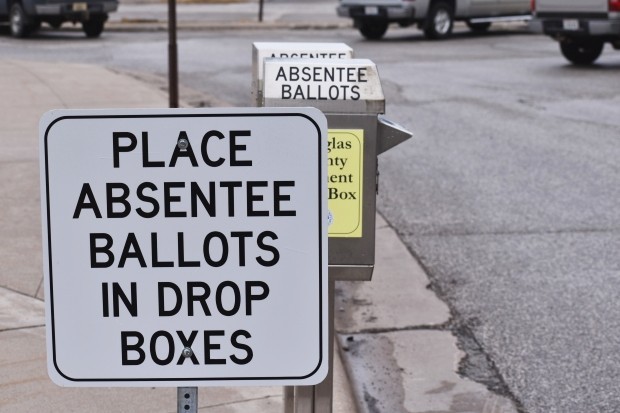Four Disabled Voters Sue State in Federal Court
WI Supreme Court ruling on absentee voting bars them from casting ballots, suit says.

Superior had a drop box for absentee ballots outside the city’s government center polling location in 2020. Danielle Kaeding/WPR
Four Wisconsin voters living with disabilities want a federal judge to rule that they can receive assistance voting after the Wisconsin Supreme Court limited the ways that absentee ballots can be returned.
Law Forward, a nonprofit law firm, is representing the four voters. They filed the lawsuit Friday against the Wisconsin Elections Commission and its administrator Meagan Wolfe. All four voters are physically incapable of casting a ballot in person and require the assistance of caretakers to send in absentee ballots.
The four voters said the court’s decision and Wolfe’s remarks effectively bar them from taking part in absentee voting. They want a federal judge to prevent them “from being illegally deprived of their right to vote.” They argue that WEC’s interpretation and application of the law violates the U.S. Constitution, the Voting Rights Act, the Civil Rights Act, and the Americans with Disabilities Act.
“We think that when voters cast these absentee ballots, they have a right to do so through a third party, what we call ballot return assistance,” said Scott Thompson, an attorney who filed the lawsuit on behalf of voters. “And we are just making sure that these federal protections that secure that right are clarified and cemented here in Wisconsin.”
Attorney General Josh Kaul, who is representing the commission in the lawsuit, said in a statement Monday that a voter can have someone else place their absentee ballot in the mail.
“Every eligible voter in Wisconsin should be able to cast a ballot,” said Kaul.
The four voters who brought the lawsuit through Law Forward are Timothy Carey of Appleton, Martha Chambers of Milwaukee, Scott Luber of Mequon and Mike Reece of Sun Prairie.
Both Carey and Luber have muscular dystrophy and are unable to move their bodies, relying on ventilators to stay alive. Chambers is paralyzed from the neck down after falling from a horse nearly 30 years ago. Reece has cerebral palsy that has limited his physical mobility, making him unable to vote at his local polling location.
Thompson said it’s out of the question for two voters to get to a polling place. He noted Carey has a caretaker with him 24/7 who helps him get around, and a ventilator is mounted to his wheelchair.
“For him to leave his home at any point is a Herculean task, something that he can’t do on his own, and the same is true for Mr. Reece,” said Thompson. “And so for these voters, their absentee ballots are really the only way they can vote.”
Thompson said the Wisconsin Supreme Court’s decision not to interpret how Wisconsin law and federal law intertwine has created confusion that’s left voters with disabilities in the lurch. He said they deserve clarity and confidence that their votes will count.
“We have a group of voters who, through no fault of their own, have seen their rights come under scrutiny mostly as the result of two partisan extremists from Wisconsin, who decided to file a lawsuit to narrow the right to vote for everybody,” said Thompson.
The conservative Wisconsin Institute for Law and Liberty filed a lawsuit on behalf of two Waukesha County voters last year, seeking to end the practice of using drop boxes for absentee ballots. They argued state law required voters to return their own ballots whether it was being returned to a clerk’s office or by mail.
“The Wisconsin Elections Commission guidance on drop boxes and ballot harvesting was not limited to disabled persons who may require assistance and was unlawful. Citizens have every right to ask their government to follow the law. That’s not partisan or extremism,” said Rick Esenberg, WILL’s president and general counsel. “We have made clear from the start that we do not oppose fair and reasonable accommodations for persons with a disability that make such an accommodation necessary.”
The state Supreme Court’s ruling in WILL’s case banned the use of those boxes, and the lawsuit filed by Thompson doesn’t address that part of the decision.
Monica Murphy, managing attorney with Disability Rights Wisconsin, stressed that people living with disabilities still have rights to reasonable accommodations when voting. She told Wisconsin Public Radio‘s “The Morning Show” Tuesday that those accommodations include having someone assist with casting a ballot as long as it’s not the voter’s boss, union representative or a candidate.
“If it becomes a situation where there isn’t time for the ballot to get there in time, and they need assistance with someone else delivering their ballot, we are recommending that they have a letter asking for reasonable accommodation to the clerk,” said Murphy.
Staff with Disability Rights Wisconsin will post a sample letter on the group’s website for people to send to their local clerks, requesting accommodations. Murphy said a lot of people are frustrated and feeling disenfranchised as a result of the state Supreme Court’s ruling and statements by the commission’s administrator.
“We are going to be sending out a letter to all the elections clerks in Wisconsin reinforcing this and reminding them of their obligations to accommodate voters with disabilities,” said Murphy.
Listen to the WPR report here.
‘Absentee ballots are really the only way they can vote’: Voters living with disabilities seek clarity was originally published by Wisconsin Public Radio.






















The necessity of a law suit such as this is extremely disturbing. The radical Wisconsin Supreme Court continues to make decisions motivated by their politics, instead of the common good.